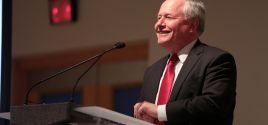“They forced me to pray towards the U.S. not Mecca”AljazeeraMar. 04, 2006 |
Popular 
Bill Kristol: My Fellow White Americans Are 'The Enemy'

Israel Detains American Journalist for Reporting on Damage from Iran's Strikes [UPDATE]

Journalist Jeremy Loffredo Released After Four Days in Israeli Detention, Ordered Not to Leave

Chris Rufo Discovers Who is Flooding The Small Town of Charleroi, Pennsylvania With Haitian Migrants

WATCH: New Film 'Atrocity Inc' Exposes How Israel Lied About October 7th to Justify Genocide
 Already facing mounting international pressure over the treatment of detainees at its detention camps in Guantanamo, Iraq, Afghanistan and elsewhere, the Bush administration lawyers, have stated bluntly that the new law that bans cruel, inhuman or degrading treatment of detainees in U.S. custody does not apply to people held at the military prison. Yesterday, in a federal court and in legal filings, Justice Department lawyers ruled that a detainee at Guantanamo Bay, Cuba, shouldn’t use legislation drafted by Sen. John McCain (R-Ariz.) to challenge treatment that the detainee's lawyers described as "systematic torture", arguing that another portion of that same law, the Detainee Treatment Act of 2005, denies all Guantanamo detainees access to U.S. courts. Then comes another episode in the series of U.S scandals involving the treatment of detainees held as part of the U.S. President, George W. Bush so called war on terror. According to recently uncovered Pentagon documents, a British national, who was captured in Afghanistan in 2001 and later transferred to Guantanamo prison, described how police had sex in front of him, tried to feed him pork and misled him into praying toward America instead of Mecca, Pentagon documents show. Feroz Ali Abbasi, who admitted training as a militant in Afghanistan yet denied allegations that he’s a member of Osama Bin Laden’s Al Qaeda network, tried to change his status from "enemy combatant" to prisoner of war in accordance with the Geneva Convention. The British government negotiated his release in January 2005, and managed to free him a day later, saying the only information against him was “confidential intelligence”. But Abbasi was denied the right to even see that classified evidence during his hearing. "Mr Abassi, your conduct is unacceptable and this is your absolute final warning. I do not care about International Law. I do not want to hear the words International Law again. We are not concerned about International Law," the colonel insisted before having Abassi removed. Abassi’s testimony is included in the documents released to The Associated Press. In the documents, Abbasi described how two military police officers had sex near him on two separate occasions; once, while they believed him to be asleep, he said, and another "while he was praying," The Age reported. Abbasi also stated that one military police officer "knowingly and willfully misdirected" him to pray toward the north - the direction of the United States - instead of east toward Mecca, Islam's holy city. Another officer, said Abbasi's statement to the tribunal, tried to feed the detainee "a hot plate of pork" - food forbidden by Islam. Also yesterday, Fawzi Al Odah, a Kuwaiti national held at Guantanamo Bay described to the BBC in a rare interview how U.S. guards force-fed hunger strikers, which he said amounts to torture. The strapped hunger strikers to a chair and force-fed them through a tube three times a day, said Al Odah, who has been held at the base since 2002, and was among the 84 Guantanamo detainees who went on hunger strike in December. The BBC Today programme's Jon Manel submitted questions for Mr Odah to his lawyer, Tom Wilner, who has the permission to visit the camp. Al Odah told the BBC that he felt like an old man despite being only 29. "If anything bad happens to the United States anywhere in the world, they immediately react to us and treat us badly, like animals," he said. "I'm always tired. I have pain in my kidneys. I have trouble breathing. I have pain in my heart and am short of breath. I have trouble urinating and having bowel movements. "Death in this situation is better than being alive and staying here without hope," Mr Odah added. The U.S. has said it is holding Mr Odah because he is a dangerous "enemy combatant". He dismissed the general allegations, branding them as "rubbish" and "absolutely untrue", but he refuses to elaborate, saying he’s waiting to discuss the accusations against at a court hearing. The UN Human Rights Commission has recently stated that force-feeding at Guantanamo as a form of torture, a charge the U.S. strongly rejects. Last year, the U.S. Supreme Court acknowledged the jurisdiction of federal courts over the detainees – no longer was Guantanamo a lawless land subject only to the President’s will. But Congress dimmed that light: the Graham-Levin-Kyl amendment passed last December so restricts the detainees’ access to federal courts as to be almost meaningless. There is still time for the Administration to do the right thing at Guantanamo, Human Rights Watch says on its website- “Bush's admin should release detainees it has no legal authority to hold; it should provide courts-martial or criminal trials to detainees believed to have committed crimes; and it should allow the detainees to speak to outsiders who could tell their stories to the world,” the HRW says. |



